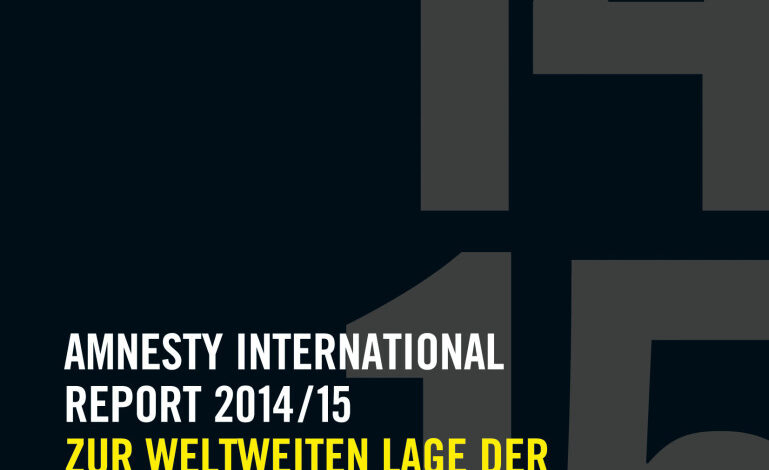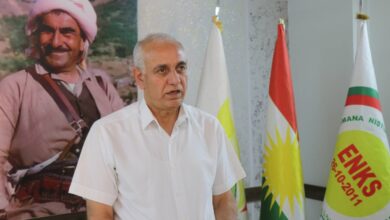
AMNESTY INTERNATIONAL ANNUAL REPORT 2014/2015
By Salil Shetty, Secretary General at Amnesty International
Governments pay lip service to the importance of protecting civilians. And yet the world’s politicians have miserably failed to protect those in greatest need. Amnesty International believes that this can and must finally change.
International humanitarian law – the law that governs the conduct of armed conflict – could not be clearer. Attacks must never be directed against civilians. The principle of distinguishing between civilians and combatants is a fundamental safeguard for people caught up in the horrors of war.
And yet, time and again, civilians bore the brunt in conflict. In the year marking the 20th anniversary of the Rwandan genocide, politicians repeatedly trampled on the rules protecting civilians – or looked away from the deadly violations of these rules committed by others.
Salil Shetty WE MUST HOPE THAT, LOOKING BACKWARD TO 2014 IN THE YEARS TO COME, WHAT WE LIVED THROUGH WILL BE SEEN AS AN ULTIMATE LOW POINT FROM WHICH WE ROSE UP AND CREATED A BETTER FUTURE.
2014 IN 18 EVENTS



International failures
The UN Security Council had repeatedly failed to address the crisis in Syria in earlier years, when countless lives could still have been saved. That failure continued in 2014. In the past four years, more than 200,000 people have died – overwhelmingly civilians – and mostly in attacks by government forces. Around 4 million people from Syria are now refugees in other countries. More than 7.6 million are displaced inside Syria.
The Syria crisis is intertwined with that of its neighbour Iraq. The armed group calling itself Islamic State (IS, formerly ISIS), which has been responsible for war crimes in Syria, has carried out abductions, execution-style killings, and ethnic cleansing on a massive scale in northern Iraq. In parallel, Iraq’s Shi’a militias abducted and killed scores of Sunni civilians, with the tacit support of the Iraqi government.
The July assault on Gaza by Israeli forces caused the loss of 2,000 Palestinian lives. Yet again, the great majority of those – at least 1,500 – were civilians. The policy was, as Amnesty International argued in a detailed analysis, marked by callous indifference and involved war crimes. Hamas also committed war crimes by firing indiscriminate rockets into Israel causing six deaths.
Governments who have been most eager to speak out loudly on the failures of other governments have shown themselves reluctant to step forward and provide the essential assistance that refugees require.
Photos: ©ALAA AL-MARJANI/Reuters/Corbis Shi’ite, ©2014 Getty Images, ©REUTERS/FinbarrAO’Reilly


Horrors of war
In Nigeria, the conflict in the north between government forces and the armed group Boko Haram burst onto the world’s front pages with the abduction, by Boko Haram, of 276 schoolgirls in the town of Chibok, one of countless crimes committed by the group. Less noticed were horrific crimes committed by Nigerian security forces and those working with them against people believed to be members or supporters of Boko Haram, some of which were recorded on video, revealed by Amnesty International in August; bodies of the murdered victims were tossed into a mass grave.
In the Central African Republic, more than 5,000 died in sectarian violence despite the presence of international forces. The torture, rape and mass murder barely made a showing on the world’s front pages. Yet again, the majority of those who died were civilians.
And in South Sudan – the world’s newest state – tens of thousands of civilians were killed and 2 million fled their homes in the armed conflict between government and opposition forces. War crimes and crimes against humanity were committed on both sides.
Photos: ©Amnesty International Central, ©AFOLABI SOTUNDE/Reuters/Corbis
UN VETO
The above list – as this latest annual report on the state of human rights in 160 countries clearly shows – barely begins to scratch the surface. Some might argue that nothing can be done, that war has always been at the expense of the civilian population, and that nothing can ever change.
This is wrong. It is essential to confront violations against civilians, and to bring to justice those responsible. One obvious and practical step is waiting to be taken: Amnesty International has welcomed the proposal, now backed by around 40 governments, for the UN Security Council to adopt a code of conduct agreeing to voluntarily refrain from using the veto in a way which would block Security Council action in situations of genocide, war crimes and crimes against humanity.
That would be an important first step, and could save many lives.
The failures, however, have not just been in terms of preventing mass atrocities. Direct assistance has also been denied to the millions who have fled the violence that has engulfed their villages and towns.



More than words
Those governments who have been most eager to speak out loudly on the failures of other governments have shown themselves reluctant to step forward and provide the essential assistance that those refugees require – both in terms of financial assistance, and providing resettlement. Approximately 2% of refugees from Syria had been resettled by the end of 2014 – a figure which must at least triple in 2015.
Meanwhile, large numbers of refugees and migrants are losing their lives in the Mediterranean Sea as they try desperately to reach European shores. A lack of support by some EU Member States for search and rescue operations has contributed to the shocking death toll.
One step that could be taken to protect civilians in conflict would be to further restrict the use of explosive weapons in populated areas. This would have saved many lives in Ukraine, where Russian-backed separatists (despite unconvincing denials by Moscow of its involvement) and pro-Kyiv forces both targeted civilian neighbourhoods.
The importance of the rules on protection of civilians means that there must be true accountability and justice when these rules are violated. In that context, Amnesty International welcomes the decision by the UN Human Rights Council in Geneva to initiate an international inquiry into allegations of violations and abuses of human rights during the conflict in Sri Lanka, where in the last few months of the conflict in 2009, tens of thousands of civilians were killed. Amnesty International has campaigned for such an inquiry for the past five years. Without such accountability, we can never move forward.
Photos: ©2014 Getty Images, ©ANTONIO PARRINELLO/Reuters/Corbis, ©Oleksandr Ratushniak/Demotix/Corbis
FIVE FACES OF 2014



Attacking the messenger
Other areas of human rights continued to require improvement. In Mexico, the enforced disappearance of 43 students in September was a recent tragic addition to the more than 22,000 people who have disappeared or gone missing in Mexico since 2006; most are believed to have been abducted by criminal gangs, but many are reported to have been subjected to enforced disappearance by police and military, sometimes acting in collusion with those gangs. The few victims whose remains have been found show signs of torture and other ill-treatment. The federal and state authorities have failed to investigate these crimes to establish the possible involvement of state agents and to ensure effective legal recourse for the victims, including their relatives. In addition to the lack of response, the government has attempted to cover up the human rights crisis and there have been high levels of impunity, corruption and further militarization.
In 2014, governments in many parts of the world continued to crack down on NGOs and civil society – partly a perverse compliment to the importance of civil society’s role. Russia increased its stranglehold with the chilling “foreign agents law”, language resonant of the Cold War. In Egypt, NGOs saw a severe crackdown, with use of the Mubarak-era Law on Associations to send a strong message that the government will not tolerate any dissent. Leading human rights organizations had to withdraw from the UN Human Rights Council’s Universal Periodic Review of Egypt’s human rights record because of fears of reprisals against them.
Government leaders have justified horrific human rights violations by talking of the need to keep the country “safe”. In reality, the opposite is the case.
Photos: ©LatinContent/Getty Images, ©STRINGER/Reuters/Corbis, ©ASMAA WAGUIH/Reuters/Corbis
COURAGE
As has happened on many previous occasions, protesters showed courage despite threats and violence directed against them. In Hong Kong, tens of thousands defied official threats and faced down excessive and arbitrary use of force by police, in what became known as the “umbrella movement”, exercising their basic rights to freedoms of expression and assembly.
Human rights organizations are sometimes accused of being too ambitious in our dreams of creating change. But we must remember that extraordinary things are achievable. On 24 December, the international Arms Trade Treaty came into force, after the threshold of 50 ratifications was crossed three months earlier.
Amnesty International and others had campaigned for the treaty for 20 years. We were repeatedly told that such a treaty was unachievable. The treaty now exists, and will prohibit the sale of weapons to those who may use them to commit atrocities. It can thus play a crucial role in the years to come – when the question of implementation will be key.



Hope ahead
2014 marked 30 years since the adoption of the UN Convention against Torture – another Convention for which Amnesty International campaigned for many years, and one reason why the organization was awarded the Nobel Peace Prize in 1977.
This anniversary was in one respect a moment to celebrate – but also a moment to note that torture remains rife around the world, a reason why Amnesty International launched its global Stop Torture campaign this year.
This anti-torture message gained special resonance following the publication of a US Senate report in December, which demonstrated a readiness to condone torture in the years after the 11 September 2001 attacks on the USA. It was striking that some of those responsible for the criminal acts of torture seemed still to believe that they had nothing to be ashamed of.
From Washington to Damascus, from Abuja to Colombo, government leaders have justified horrific human rights violations by talking of the need to keep the country “safe”. In reality, the opposite is the case. Such violations are one important reason why we live in such a dangerous world today. There can be no security without human rights.
We have repeatedly seen that, even at times that seem bleak for human rights – and perhaps especially at such times – it is possible to create remarkable change.
We must hope that, looking backward to 2014 in the years to come, what we lived through in 2014 will be seen as a nadir – an ultimate low point – from which we rose up and created a better future.
Photos: ©Amnesty International, ©Getty Images, ©SUZANNE PLUNKETT/Reuters/Corbis




